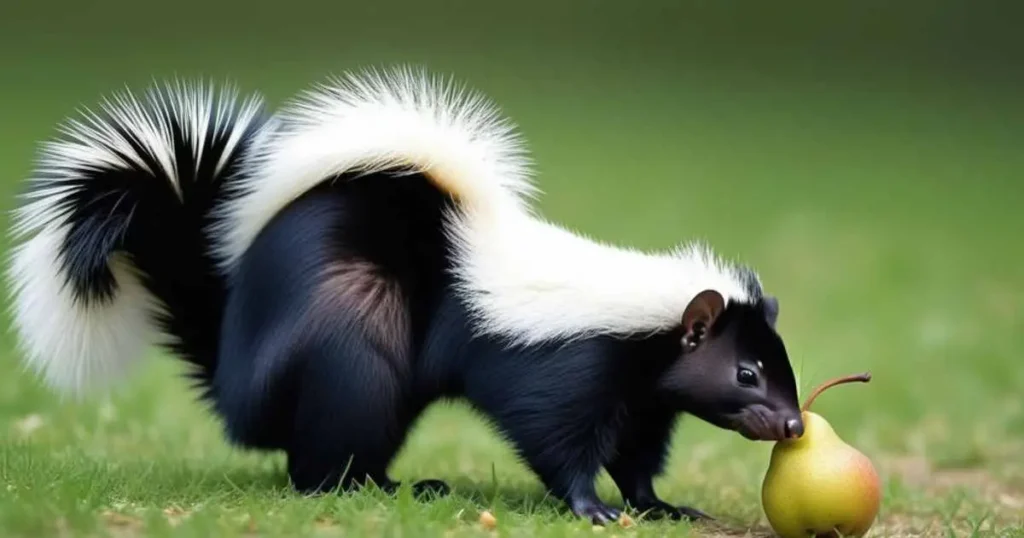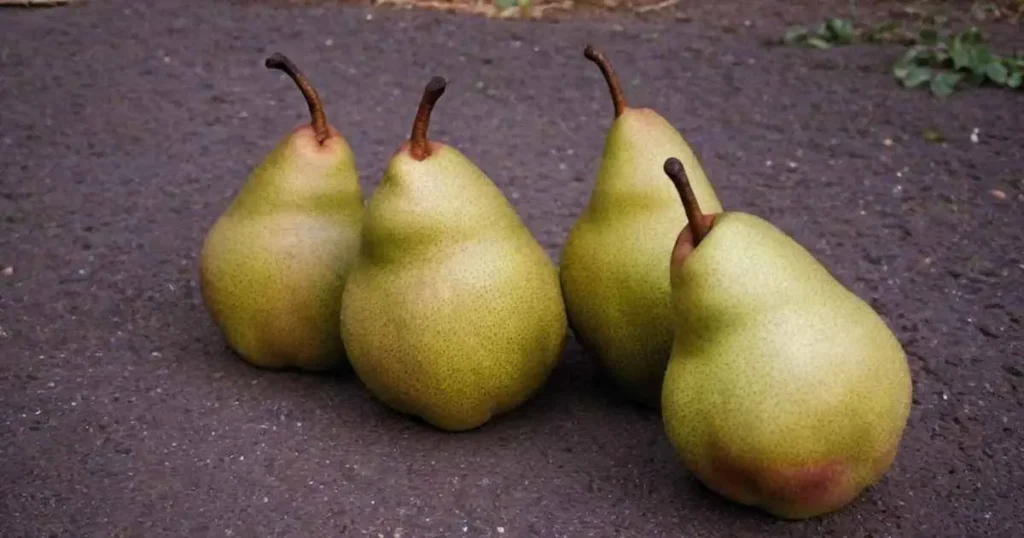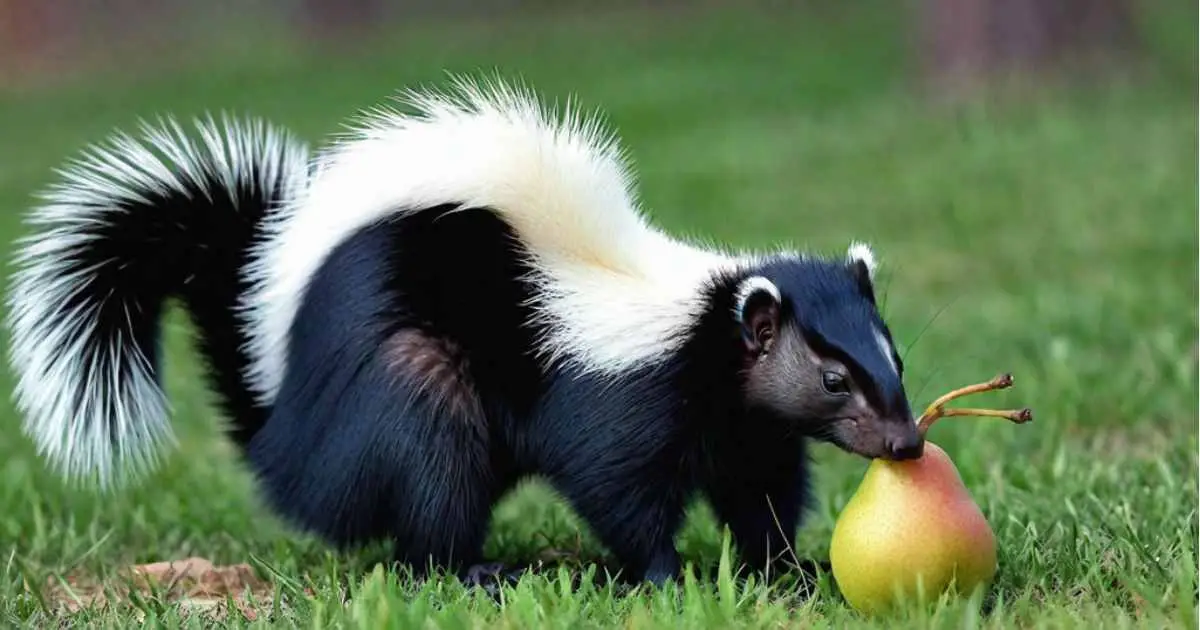Can Skunks Eat Pears?
Last updated on September 26th, 2024 at 06:22 am
Did you know skunks are big fans of pears? As someone who loves skunks and studies them, I’ve learned that these black and white critters love munching on ripe, sweet pears. Skunks are omnivores, meaning they eat lots of different things, from bugs to fruits. This helps keep nature balanced. If you’re interested in learning more about skunks and their eating habits, keep reading to find out why they might be visiting your garden!
Skunks: The Omnivorous Foragers
Skunks showcase an impressive adaptability in their dining choices. These black and white creatures enjoy a varied diet, making them true omnivores. Exploring the eating habits of skunks reveals a diet that includes fruits like pears. Let’s dive into their dietary preferences and season-based adjustments.
Dietary Habits Of Skunks
Skunks have a diverse menu that changes with what’s available. They eat both plants and animals. Here’s a snapshot of a skunk’s diet:
- Insects and small rodents satisfy their protein needs.
- They feast on various fruits, including pears, apples, and berries.
- Foliage and grasses provide them with vital nutrients.
- Skunks also munch on eggs and nutritious nuts.
These adaptable mammals enjoy treats found in nature’s pantry. But do they relish pears? Yes, pears are on the menu. These juicy fruits offer skunks a sweet and nutritious snack, particularly during the late summer months when pears ripen.
Seasonal Adjustments In Skunk Diet
As seasons change, so does a skunk’s diet. Skunks adjust their eating habits to match the times of year. Let’s examine this closer:
| Season | Primary Foods |
|---|---|
| Spring | Insects, small rodents, budding plants |
| Summer | Fruits like pears, insects, small mammals |
| Fall | Leftover nuts, carrion, and food stored from fall |
| Winter | Leftover nuts, carrion, food stored from fall |
With the arrival of summer, skunks switch to a diet rich in fruits and insects. Pears are a seasonal favorite. In the fall, they stock up on fattier foods, preparing for the colder months. As insects become scarce in winter, they depend on their fall reserves.
Pears In The Wild
The sight of skunks feasting on pears might seem unusual. Yet, these bushy-tailed creatures enjoy a range of foods. With pears dropping from trees in the wild, they offer a tempting treat for local wildlife, including skunks.
Nutritional Value Of Pears For Wildlife
Rich in nutrients, pears provide valuable health benefits to wild animals. They are packed with vitamins, fiber, and water, essential for a balanced diet. Skunks, whose eating habits are not picky, gain much-needed energy and hydration from these fruits.
| Nutrient | Benefit |
|---|---|
| Vitamin C | Boosts immunity |
| Fiber | Aids digestion |
| Water Content | Ensures hydration |
Availability Of Pears In Skunk Habitats
Pears grow in various climates and regions, overlapping with many skunk habitats. These fruits generally thrive in temperate zones, where skunks often reside. When pears fall to the ground, they become accessible snacks for these foraging animals.
- Common in deciduous forests
- Found in orchards and backyards
- Seasonally abundant
Skunks benefit from the pears’ location on the ground, as they are not adept climbers. The seasonal abundance of pears ensures a supplemental food source during certain times of the year.
The Skunk’s Diet: An In-depth Look
Skunks are known for their distinctive spray, but their diet is just as unique. These creatures navigate their habitats with an appetite that is both varied and adaptable. To understand what skunks eat, let’s delve into their preferred food sources and the role plant matter plays in their dietary habits. Do skunks eat pears, along with their more typical foraging finds? Let’s find out.

Preferred Food Sources For Skunks
Skunks exhibit omnivorous behavior, meaning their diet includes both plant and animal matter. Here’s a snapshot of their favorite picks:
- Insects: They’re rich in protein.
- Small rodents: Skunks often hunt for mice and voles.
- Eggs: They raid nests for a nutritious snack.
- Fruit: Yes, they eat soft fruits when available.
Due to their diverse diet, skunks enjoy various food types based on seasonal availability.
Plant Matter In A Skunk’s Diet
While skunks have a fondness for protein-rich foods, plants are crucial in their diet too.
| Type of Plant Matter | Examples in Diet |
|---|---|
| Fruits | Pears, berries, fallen apples |
| Nuts & Seeds | Acorns, sunflower seeds |
| Vegetation | Grasses, leaves, buds |
Seasonality influences this aspect of skunk diets. In the wild, they often turn to plant-based foods when other sources are scarce.
Skunks And Fruit: A Curious Affair
Skunks are known for their distinctive smell, but there’s more to these creatures than just their notorious defense mechanism. These nocturnal animals have a diet that might surprise many—fruits are a part of it! The relationship between skunks and fruit is quite interesting, with pears being one of the many fruits they eat. Let’s explore how these animals interact with different fruits and what this means for their health and well-being.
How Skunks Approach Different Fruits
Despite their reputation, skunks are omnivores with a diverse diet. When it comes to fruit, they are not very picky eaters. Food selection often depends on availability and season. Here’s how they approach different types of fruits:
- Soft Fruits: Skunks easily enjoy soft fruits like pears, which are simple to bite into and digest.
- Hard Fruits: Items like apples might require more effort, but skunks manage by breaking them into smaller, manageable pieces.
- Berries: These are a skunk favorite, often eaten directly from bushes.
Risks And Benefits Of Fruits For Skunks
Fruits carry various health benefits and potential risks for skunks. Below are the key points:
| Benefits | Risks |
|---|---|
| Natural sugars for energy | Overeating can lead to obesity |
| Vitamins for overall health | Pesticides on non-organic fruits |
| Fiber for digestion | Potential for fruit to ferment in stomachs |
Incorporating fruits into their diet can be nutritious for skunks, offering an energy boost and essential nutrients. However, consuming too much, especially fruits with high sugar content like pears, can be harmful. It’s crucial for skunks to maintain a balanced diet to avoid health issues.
Pears: A Potential Delicacy For Skunks?
Skunks are known for their striking black and white fur and their unique defense mechanism. Their diet is quite varied, but could pears be part of their menu? This sweet and juicy fruit may seem like an unlikely choice for these nocturnal creatures. Yet, intriguing signs suggest skunks might enjoy pears as much as humans do.
Anecdotal Evidence Of Skunks Eating Pears
Stories from gardeners often highlight the diverse appetites of skunks. Many have reported finding skunks nibbling on fallen pears in their backyards. Such tales provide clues about skunk preferences. While not scientific proof, they are valuable observations.
- Skunks seen near pear trees at dusk
- Pear bites match skunk dental patterns
- Frequent pear remnants in skunk habitats
Scientific Observations Of Skunk Behavior With Pears
Research on skunk diets gives a broader understanding. Scientists have catalogued various foods consumed by skunks. Fruits, including pears, do appear in these studies. Pears offer vitamins and sugars enticing to these omnivores.
| Study | Findings |
|---|---|
| Omnivore Diet Analysis | Fruits are part of the skunk’s diet |
| Nutritional Needs Study | Skunks may seek out pears for sugars and vitamins |
Safeguarding Orchards From Skunks
Gardeners and orchard owners know all too well that skunks have a sweet tooth for pears. These stripe-tailed infiltrators can wreak havoc on fruit crops, making protection vital. Understanding the dining habits of skunks helps in creating effective barriers. Let’s explore how to keep these nocturnal visitors away from your precious pears.
Effective Deterrents
Keeping skunks at bay requires strategic planning. Here, we discuss deterrents that make orchards less appealing to skunks. Proven methods include odor repellents, noise machines, and bright lights. Each tactic targets skunk sensitivities to odors and sounds. For instance:
- Lights: Motion-activated to startle skunks.
- Noises: Radios or ultrasonic devices create a noisy environment.
- Smells: Skunks dislike ammonia or citrus peels.
Skunk-proofing Techniques
Physical barriers provide long-term solutions. Installing below-ground fencing prevents digging. A mesh wire fence should stand at least 3 feet high with a 12-inch bend outward at the top. This curve confuses skunks, making climbing difficult. Here are more skunk-proof strategies:
| Technique | Description |
|---|---|
| Fences | Buried 1-2 feet underground to block digging. |
| Natural Barriers | Plant prickly bushes as natural impediments. |
| Secure Garbage | Keep trash cans sealed, reducing food attraction. |
The Impact Of Skunk Snacking On Fruit Crops
When skunks target orchards, they don’t just eat the fruits. Their digging habits can damage tree roots. Multiple skunk visits can significantly reduce a season’s harvest. Skunk snacking also affects fruit quality. Punctured fruits are prone to rot and insects. Organic farmers particularly need to stay vigilant as they avoid pesticides. Thus, applying non-toxic strategies is critical.
- Inspect regularly for holes or skunk activity.
- Remove fallen fruits to reduce temptation.
- Apply mild, skunk-repelling substances around trees.
Other Fauna That Compete For Pears
The quest for pears in the wild often turns into a competitive spree. It is not just humans who savor the juicy sweetness of pears. A myriad of animals regularly partake in this fruit feast. Among them, skunks are unexpected guests. But they are not alone in their quest for these luscious treats.

Common Fruit-eating Competitors In The Wild
- Birds: Winged creatures often snatch the ripe offerings from branches.
- Squirrels: Agile climbers, collect and hoard pears for later consumption.
- Raccoons: Nocturnal foragers, they find pears a delightful nighttime snack.
- Opossums: These omnivores enjoy fruits as much as they do small rodents.
- Deer: They boldly venture into orchards, nibbling on both fruit and foliage.
How Skunks Fare In The Competition For Food Sources
Skunks, with their distinctive black and white coats, are mainly known for their defensive spray. Yet, they too have a fondness for fruits. In the food chain, skunks often find themselves competing for pears. Their foraging habits are generally nocturnal, allowing them a unique advantage.
Unlike the more agile climbers, skunks benefit from fallen fruits. They rely on their strong sense of smell to locate these treats. While other animals may get the first pick, skunks clean up what is left behind. With pears in their diet, skunks enjoy the nutritional boost these fruits offer.
| Animal | Method of Foraging | Advantage |
|---|---|---|
| Skunks | Scavenging for fallen pears | Nighttime foraging, less competition |
| Birds | Picking from branches | Daytime foraging, high mobility |
| Squirrels | Climbing and hoarding | Agility in trees, storing for later |
Educating The Public On Skunk Diets
Skunks, often recognized by their bold black and white coloring and potent defense mechanism, are frequently misunderstood creatures, particularly regarding their dietary preferences. Our section on ‘Educating the Public on Skunk Diets’ aims to dispel myths and shed light on what skunks actually eat, including the question: Do skunks eat pears?
Misconceptions About Skunks And Their Eating Habits
Many people believe skunks are solely meat-eaters. This is not true. Skunks are omnivores, meaning they eat both plant and animal matter. The belief that skunks only eat insects or small rodents is a common misconception. In reality, their diet is quite varied and can include fruits such as pears.
Why Understanding Skunk Diets Is Important
Why should we care about a skunk’s diet? Understanding what skunks eat helps us live harmoniously with them. Skunks may visit your garden not to spray but in search of food. If they find fruits like pears, they may become regular visitors. On the other hand, understanding their diet also helps in creating deterrents to keep them away from certain areas humanely. Additionally, appreciating their dietary habits can foster greater respect and a more informed perspective towards these misunderstood creatures.
Frequently Asked Questions
Do Skunks Like Pears?
Skunks are omnivores and enjoy a variety of foods, including pears. These fruits can be a part of their natural diet.
Do Wild Skunks Eat Fruit?
Yes, wild skunks do eat fruit. They often include berries and fallen fruit in their omnivorous diet.
What Should You Not Feed A Skunk?
Avoid feeding skunks chocolate, caffeine, alcohol, onions, garlic, and salty, sugary, or processed foods. These items can be harmful. Stick to a diet close to their natural food intake.
Conclusion
Wrapping up, skunks indeed find pears a tasty treat when available. This preference adds diversity to their omnivorous diet. Gardeners take note – securing your pear trees could be wise. Remember, understanding skunk behavior helps in peaceful coexistence. Embrace nature’s complexity and protect your pears!

